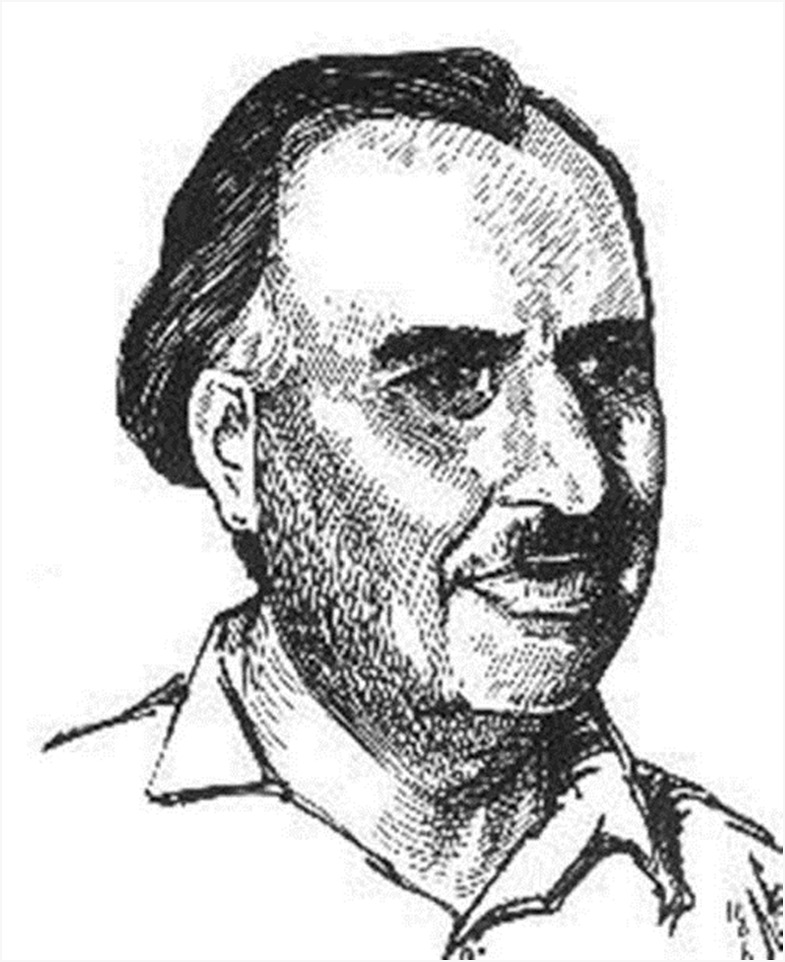
Dina Nath Nadim, born on March 18, 1916, in Srinagar, was a prominent poet and a leading voice of Kashmiri poetry. He revolutionized Kashmiri literature and left an indelible mark on the region’s cultural landscape. Nadim’s poetic genius transcended languages, encompassing Kashmiri, Hindi, and Urdu poetry. He was also actively involved in the Progressive Writers’ Association in Kashmir, advocating for social change and progress through his literary contributions. His poems inspired numerous budding writers and had a profound impact on the literary community.
Born into a modest family, Nadim’s father, Pt. Shankar Kaul, passed away when he was only eight years old. He was brought up in poverty, and his mother played a significant role in shaping his upbringing and nurturing his poetic talents. Hailing from the village of Muran, where oral poetry was deeply embedded in the local culture, Nadim’s mother sang the vaakhs (verses) of Lalded and poems by other poets. This had a profound influence on the young Nadim, igniting the flame of poetic genius within him.
Nadim completed his academic qualifications, obtaining a B.A. degree in 1943 and a B.Ed. degree in 1947. He then embarked on a career in teaching, working at the Hindu High School in Srinagar for many years. After India gained independence, he was appointed as the Assistant Director of Social Education. Due to his cultural background and literary achievements, Nadim also became a member of the Sahitya Academy, an organization dedicated to promoting Indian literature. Throughout his literary journey, he was deeply influenced by communism and the progressive writers’ movement. As a result, he played a pivotal role in establishing the Leftist movement in Kashmir. His affiliation with communism also provided him with opportunities to visit the USSR and China. Given his strong leaning toward Leftist ideologies, Nadim regularly contributed to Kwang Posh, a monthly journal run by the communists of Kashmir. In recognition of his commitment to communism, he was awarded the Nehru Award in 1971. Additionally, he received the prestigious Sahitya Academy Award for his collection of poems titled “Shihul Kul.”
Most of Nadim’s writings were either presented in poetic symposia or published in local journals. He has composed around 150 poems in total, spanning English, Hindi, and Urdu languages. His works are cherished for their lyrical beauty and deep emotional resonance, capturing the essence of Kashmiri culture and life.
It is worth noting that during the budget presentation in 2020, India’s Finance Minister, Nirmala Sitharaman, recited a poem by the great Kashmiri poet Nadim. She provided a translation of the poem while emphasizing its significance and beauty:
“Our homeland is like the blooming Shalimar Bagh,
Our homeland is like a lotus blooming in the Dal Lake,
Our homeland is like the warm blood of the youth,
My homeland, your homeland, our homeland,
The most beloved homeland in the world.”
This extraordinary gesture shines a spotlight on the profound significance and indelible impact of Nadim as a poet in Indian literature.
In a mesmerizing interview available on the web, Dinanath Nadim eloquently portrays his life’s journey, stating, “I was born in the enchanting city of Srinagar. From a tender age, the allure of poetry captivated me. However, in the early days, I harbored a deep reluctance to share my verses with others or seek their publication. Regrettably, many of my poems were lost, scribbled on mere cigarette packets. —-Renowned Hindi poet Harivansh Rai Bachchan translated several of my poems, while Kamleshwar, another illustrious figure in Hindi literature, has hailed me as the “Icon of Kashmiri Literature.” Nevertheless, the truest joy for me lies in the resounding applause of the audience as I recite a poem on stage. In my view, literature holds genuine value when it actively contributes to the betterment of society.”
Though the present generation in Kashmir may not vividly recall Dina Nath Nadim, his historical legacy and profound contributions to the literary realm. In fact, the tapestry of Kashmiri literature remains incomplete without his name woven into its fabric. He emerged during a critical juncture when Kashmir stood at a crossroads, grappling with the aftermath of the Kabaili (tribal)raid and the urgent need to defend the valley from invaders hailing from Pakistan. Poets and writers played a pivotal role in the region’s reclamation from the clutches of adversity. It is within this context that Nadim’s contribution has become eternally imprinted in the collective memory of the people and the place.
The poetic landscape in Kashmir faced challenging times with the loss of Master Zinda Kaul and Mahjoor, creating a void in the realm of poetry. During this period, Nadim struggled to establish himself as a poet, initially experimenting with Urdu verse, but with little impact. This led him to shift his focus to Kashmiri, and when asked about this change, he responded, “My mother tongue holds a greater claim on me.” In 1942, his first Kashmiri poem, “Maej Kashmir,” was published, marking the beginning of his journey.
Nadim’s opera “BomburTeYambarzal” is regarded as one of his finest creations. He is credited with intellectualizing and revitalizing the Kashmiri language, infusing it with new meanings and broader understandings. His innovative approach to opera-writing in Kashmiri produced works such as “Vitasta” (Jhelum River), “Safar Taa Shehjaar” (The Journey and the Shade), “Heemaal Taa Naaegrai” (Heemaal and Naagraaj), “Shuhul Kull” (The Shady Tree), and the renowned “Bombur Taa Yamberzal” (Bumblebee and the Narcissus Flower). “Bombur Taa Yamberzal” became the first published opera in Kashmiri.
Among his poetic works, “Me ChhumAashPaghich” (I Am Hopeful of Tomorrow) stands out as a profoundly powerful piece in Kashmiri literature. The impact of Nadim’s talent reached international heights when Marshal Bulganin and Khrushchev, during their visit to Kashmir in 1955, witnessed the production of “Bombur Taa Yamberzal” and were deeply impressed.
I had the proud privilege of meeting and engaging with Nadim Sahib on two occasions. The first meeting took place when he served as the Principal and Director of the Lal Ded Memorial Trust/School, Badiyar (Srinagar) in the seventies. (My grand-daughter Aparna, currently in London, used to study in Lal Ded Memorial School then) The second interaction occurred during a literary seminar held at the hall of the Teachers Training College in Srinagar. Nadim Sahib delivered a beautiful lecture on Kashmiri language and literature. During this time, I was on deputation to NRLC, Patiala from Rajasthan Government, and I had the honor of leading a group of Kashmiri language trainees from the Northern Regional Language Centre, Patiala, on an environmental tour to Kashmir.
The unparalleled luminary of Kashmiri literature passed away in 1988, leaving behind a rich legacy of invaluable contributions to the Kashmiri language and literature.
(The writer is a Former Fellow, IIAS, RashtrapatiNivas, Shimla, Ex-Member,Hindi SalahkarSamiti,Ministry of Law & Justice, GOI,
Senior Fellow,Ministry of Culture, GOI





